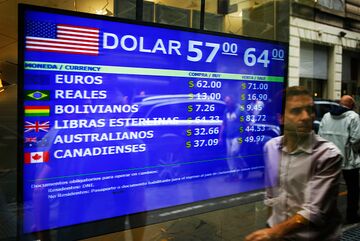Politics & Policy
Brazil Deserves Better Than Jair Bolsonaro
The angry resignation of Justice Minister Sergio Moro promises to mire the country deeper in political crisis and economic misery.
By
When a congressional back-bencher with fringe right-wing ideas took office last year, many Brazilians held their breath. Some hoped and prayed that Jair Bolsonaro might rise to the occasion, moderate his rhetoric and compensate for his lack of executive experience by delegating to a first-rate cabinet. Leave it to the adults in the room — Economy Minister Paulo Guedes, Vice President Hamilton Mourao, and Justice Minister Sergio Moro — and all would turn out well. We know now that was a fever dream. Moro’s acrimonious resignation on Friday, after accusing Bolsonaro of meddling in the justice system, is only the latest symptom.
Less than a year and half on, the former army captain has clearly neither risen to the task nor delegated to the able. Instead Bolsonaro governs by trial and error, second-guessing his ministers in favor of a bilious claque of kin and confidants. The result: Brazil’s presidency has shrunk even as the country’s challenges grow larger than ever.
In a way, Moro’s exit was a collision foretold. If Guedes was Bolsonaro’s “one-stop shop” for righting Latin America’s biggest market, he has gone conspicuously silent as the coronavirus pandemic roils the economy: When a government panel announced a national rescue plan, he was nowhere to be found. After Health Minister Luiz Henrique Mandetta drew plaudits for choosing science over faith-based policies to confront the coronavirus pandemic, Bolsonaro fired him. When uncontrolled fires in the Amazon brought global criticism, Bolsonaro sacked the respected head of the space agency monitoring the rain forest and blamed the fires on partisan saboteurs.
After presiding as a federal judge over the storied Carwash anti-corruption trials, Moro was hired as Bolsonaro’s Mr. Clean in a government pledged to bury the “old politics” of cronyism and payola. To hear it from Bolsonaro, Moro left Brasilia a self-centered liar.
True, Moro is no saint. His integrity took a beating last year, when hacked text messages leaked to the press showed that he had overreached, apparently coaching prosecutors in the storied Carwash case he presided over. And of course, ministers in any democracy serve at the chief executive’s pleasure — even super-ministers may fall.
Yet Moro’s parting shot against Bolsonaro had the whiff of an unfinished row, not a rout. “I am always at the country’s disposal,” Moro concluded in his provocative exit message. Despite his questionable Carwash actions, Moro was by far Bolsonaro’s most popular minister. Judging by the markets, he will be missed. Stock prices slumped at one point by nearly 10% on Friday and the real tanked against the dollar, forcing the central bank to intervene four times in the foreign exchange market.
Yet Moro’s parting shot against Bolsonaro had the whiff of an unfinished row, not a rout. “I am always at the country’s disposal,” Moro concluded in his provocative exit message. Despite his questionable Carwash actions, Moro was by far Bolsonaro’s most popular minister. Judging by the markets, he will be missed. Stock prices slumped at one point by nearly 10% on Friday and the real tanked against the dollar, forcing the central bank to intervene four times in the foreign exchange market.
Among his motives for resigning, Moro cited Bolsonaro’s alleged attempts to interfere in criminal investigations, pressure cops and stack the police with friends. Tellingly, Bolsonaro’s reshuffling of the federal police comes as investigators close in on his eldest son Flavio for allegedly commanding a kickback scheme and second eldest son Carlos for allegedly ginning up fake news against members of the Supreme Court. The federal police chief who was sacked against Moro’s will was “tired of being harassed” by Bolsonaro to step down, Moro later tweeted.
Bolsonaro denied any wrongdoing. In a long, rambling statement on Friday, he defended his honor “as a man, a soldier and a Christian.” He went on to rebut charges that he’d meddled in police work, although he admitted to demanding government intel on some pending investigations and to soliciting, “almost imploring,” the federal police to probe certain cases involving his family, including the man who stabbed him on the campaign trail in 2018 and was later found to be mentally impaired.
Despite Bolsonaro’s denials, Moro last night released text messages showing that he had recommended swapping out several federal police investigators who were probing wrongdoing by several legislators loyal to his government. If the charges hold up in congress, the only court where sitting politicians may be judged, they could be grist for impeachment. Brazil has been there before. Two of Brazil’s last four popularly elected presidents were removed by impeachment, the last one less than four years ago, with a push from then federal congressman Bolsonaro.
Tellingly, Bolsonaro is bleeding allies and credibility. After an internal row, he abandoned the political party he rode to office 16 months ago, and his new party has yet to pass the eligibility bar by electoral authorities. With no solid legislative base, he has lost control of the congressional agenda. His response? Turn adversaries into enemies, starting with influential congressional speaker Rodrigo Maia, and wave on the loyal Bolsonaristas who clamor for closing the congress and the Supreme Court.
Moro’s departure amid an unprecedented health emergency and the worst economic slump since the Great Depression drops a full-blown political crisis onto Brazil’s miseries. Adding yet another long and surely acrimonious impeachment process will do the country little good.
A statesman in such a corner might see as much and spare his compatriots the pain. Regrettably, Bolsonaro likes a cage fight. Bolsonaro “is digging his own grave,” former President Fernando Henrique Cardoso tweeted. “Better he renounces than be renounced.”
Brazil deserves better.
This column does not necessarily reflect the opinion of the editorial board or Bloomberg LP and its owners.





